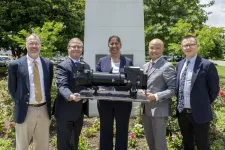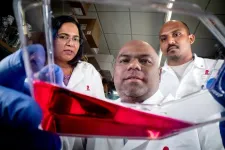(Press-News.org) In a new paper, researchers from Carnegie Mellon University and Stevens Institute of Technology show a new way of thinking about the fair impacts of AI decisions.
They draw on a well-established tradition known as social welfare optimization, which aims to make decisions fairer by focusing on the overall benefits and harms to individuals. This method can be used to evaluate the industry standard assessment tools for AI fairness, which look at approval rates across protected groups.
"In assessing fairness, the AI community tries to ensure equitable treatment for groups that differ in economic level, race, ethnic background, gender, and other categories," explained John Hooker, professor of operations research at the Tepper School of Business at Carnegie Mellon, who coauthored the study and presented the paper at the International Conference on the Integration of Constraint Programming, Artificial Intelligence, and Operations Research (CPAIOR) on May 29 in Uppsala, Sweden. The paper received the Best Paper Award.
Imagine a situation where an AI system decides who gets approved for a mortgage or who gets a job interview. Traditional fairness methods might only ensure that the same percentage of people from different groups get approved.
But what if being denied a mortgage has a much bigger negative impact on someone from a disadvantaged group than on someone from an advantaged group? By employing a social welfare optimization method, AI systems can make decisions that lead to better outcomes for everyone, especially for those in disadvantaged groups.
The study focuses on "alpha fairness," a method of finding a balance between being fair and getting the most benefit for everyone. Alpha fairness can be adjusted to balance fairness and efficiency more or less, depending on the situation.
Hooker and his co-authors show how social welfare optimization can be used to compare different assessments for group fairness currently used in AI. By using this method, we can understand the benefits of applying different group fairness tools in different contexts. It also ties these group fairness assessment tools to the larger world of fairness-efficiency standards used in economics and engineering.
Derek Leben, associate teaching professor of business ethics at the Tepper School, and Violet Chen, assistant professor at Stevens Institute of Technology, who received her Ph.D. from the Tepper School, coauthored the study.
“Common group fairness criteria in AI typically compare statistical metrics of AI-supported decisions across different groups, ignoring the actual benefits or harms of being selected or rejected,” said Chen. “We propose a direct, welfare-centric approach to assess group fairness by optimizing decision social welfare. Our findings offer new perspectives on selecting and justifying group fairness criteria.”
"Our findings suggest that social welfare optimization can shed light on the intensely discussed question of how to achieve group fairness in AI," Leben said.
The study is important for both AI system developers and policymakers. Developers can create more equitable and effective AI models by adopting a broader approach to fairness and understanding the limitations of fairness measures. It also highlights the importance of considering social justice in AI development, ensuring that technology promotes equity across diverse groups in society.
The paper is published in CPAIOR 2024 Proceedings.
END
New study offers a better way to make AI fairer for everyone
2024-06-15
ELSE PRESS RELEASES FROM THIS DATE:
NRL researchers receive Navy’s Top Scientists and Engineers Award
2024-06-14
WASHINGTON – U.S. Naval Research Laboratory scientists and engineers received the prestigious Department of Navy Dr. Delores M. Etter Top Scientists and Engineers of the Year Award, June 12, during an awards ceremony hosted at the Pentagon.
“The Top Scientists and Engineers of the Year award program recognizes and acknowledges the excellence of our highest performing scientists and engineers in support of the Department of the Navy," said Frederick J. Stefany, Assistant Secretary of the Navy for Research, ...
CDC-funded program improved cardiovascular health of Nebraska women
2024-06-14
Waltham — June 14, 2024 — When implemented in Nebraska, the WISEWOMAN program supported by the Centers for Disease Control and Prevention (CDC), which offers services for women ages 40–64 who are low-income and uninsured/underinsured, improved hypertension, blood pressure self-management, diet, physical activity, and body weight. Jianping Daniels, PhD and colleagues, of the Nebraska Department of Health and Human Services, detail these findings in a supplement to the Journal of Public Health Management and Practice, published in the Lippincott portfolio by Wolters Kluwer.
In an introduction ...
Novel gene-editing therapy continues to show positive results in sickle cell patients
2024-06-14
Researchers have presented the latest findings from a clinical trial aimed at discovering a cure for sickle cell disease, a painful genetic blood disorder with limited treatment options.
Conducted as part of the multicenter RUBY Trial, researchers shared data on the safety and effectiveness of renizgamglogene autogedtemcel (reni-cel, formerly known as EDIT-301), an experimental one-time gene editing cell therapy, among its 18 patients at the European Hematology Association 2024 Hybrid Congress (EHA) in Madrid, Spain.
This innovative treatment modifies a patient’s own blood-forming stem cells ...
Technique improves the reasoning capabilities of large language models
2024-06-14
CAMBRIDGE, MA - Large language models like those that power ChatGPT have shown impressive performance on tasks like drafting legal briefs, analyzing the sentiment of customer reviews, or translating documents into different languages.
These machine-learning models typically use only natural language to process information and answer queries, which can make it difficult for them to perform tasks that require numerical or symbolic reasoning.
For instance, a large language model might be able to memorize and recite a list of recent U.S. presidents and their birthdays, but that same model could fail if asked the question “Which U.S. presidents elected after 1950 ...
URI study examines challenges, barriers to care for individuals leaving residential substance use facilities
2024-06-14
Residential treatment is among the most effective tools for treating substance use disorder, with people in these settings showing improvement not only in their substance use but also in their mental health, social functioning and quality of life. However, when people leave residential substance use facilities, they face immense challenges as they attempt to reintegrate into their communities and return to their normal lives.
As many as 40 to 70 percent of people who complete residential treatment return ...
Some CRISPR screens may be missing cancer drug targets
2024-06-14
CRISPR/Cas9 gene editing has made possible a multitude of biomedical experiments including studies that systematically turn off genes in cancer cells to look for ones that the cancer cells heavily depend on to survive and grow. These genes, or “cancer dependencies,” are often promising drug targets. But new research shows that many of these CRISPR screening experiments rely on components, called CRISPR/Cas9 guides, that do not perform equally well in cells from people of all ancestries, which can cause CRISPR screens to miss cancer dependencies.
These CRISPR guides are short sequences of RNA that ...
$18.5 million U19 grant will study B and T memory cells in transplanted lungs, uteruses and kidneys
2024-06-14
BIRMINGHAM, Ala. – Memory immune cells reside in many tissues, poised to react to a second infection or continuing antigen. Yet little is known about these tissue-resident memory cells — how they get there, how they evolve and how they compete in tissues.
A five-year, $18.5 million grant will allow University of Alabama at Birmingham researchers to investigate T and B tissue-resident memory cells, known as TRM and BRM cells, in three unique sites — transplanted lungs, transplanted kidneys and the transplanted ...
Improving soil health yields unexpected benefits for farmers
2024-06-14
In the U.S., as farmers wrestle with extreme heat and drought, heavy rainfall and flooding, and erosion—all factors of climate change which can take a toll on crops—there's been a lot of buzz over regenerative agriculture over the past few years, as big agriculture companies promise opportunities to make money from "carbon farming" while also improving soil health.
Regenerative farming strives to improve soil health through various methods, including reduced or no tillage, keeping the soil covered year-round through ...
NYCST announces inaugural awards for space technology projects
2024-06-14
The New York Consortium for Space Technology (NYCST) is led by Cornell University, which is funded by the U.S. Department of Defense’s Office of Local Defense Community Cooperation through the Defense Manufacturing Community Support Program.
Ithaca, NY— June 14, 2024 — The New York Consortium for Space Technology Innovation and Development (NYCST) today announced more than $300 thousand has been allocated to support 6 projects through the inaugural round of the consortium’s funding program. The projects were selected during NYCST’s inaugural ...
St. Jude scientists solve decades long mystery of NLRC5 sensor function in cell death
2024-06-14
(MEMPHIS, Tenn. – June 14, 2024) The innate immune system is responsible for protecting the human body from threats that could cause disease or infection. The system relies on innate immune sensors to detect and transmit signals about these threats. One of the key innate immune strategies to respond to threats is through cell death. New research from St. Jude Children’s Research Hospital discovered that NLRC5 plays a previously unknown role as an innate immune sensor, triggering cell death. The findings, published in Cell, show how NLRC5 drives PANoptosis, a prominent type of inflammatory cell death. This understanding has implications for the development of therapeutics ...


